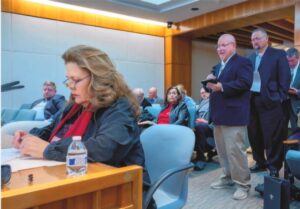2025 Legislative Update #2

TRADE PORTS ACT HEADED TO TAX AND REV
On Wednesday the House Commerce and Economic Development Committee voted 9-0 to pass House Bill 19, Trade Ports Development Act, sponsored by Reps. Patty Lundstrom (D-McKinley), Dayan Hochman-Vigil (D-Bernalillo), Raymundo Lara (D-Doña Ana), Tara L. Lujan (D-Santa Fe) and Joy Garratt (D-Bernalillo).

The Gallup McKinley County Chamber testified in strong support of the bill, joined by representatives of fellow chambers in Albuquerque and Rio Rancho. HB19 also received support from the Bernalillo County Economic Development director, NMIdea, the Brotherhood of Locomotive Engineers, the N.M. Builders and Construction Trades Council, and others. We believe the creation of ports will provide economic diversification, leverage our existing assets, will attract new businesses and create high-quality jobs, and will help us build a foundation for a thriving modern trade infrastructure.
There were no opponents to the legislation.
As explained in the bill's fiscal impact report, HB 19 "enables the state and its political subdivisions (“public partners”) to enter into public-private partnership agreements to help finance and work on trade port projects.
In his testimony for the bill, Bill Lee told the committee:
“…In recent years, our region has been devastated by not only the COVID-19 restrictions and impacts, but also the dramatic changes in the energy industry, resulting in the closure of a refinery and a coal fired power plant. The loss of these major industrial employers from McKinley County not only means that many good paying jobs have evaporated, but so too has the tax base for the county.
HB 19 would help us capitalize on our “competitive advantages” – easy access to the BNSF Transcontinental Railway, Interstate-40, our revitalized air transportation along with a Foreign Trade Zone designation being planned for the Gallup Municipal Airport, would all come together to make the opportunities afforded by HB19 a much-needed economic win.
HB 19 not only benefits Gallup/McKinley County. It is designed to provide funding support for infrastructure development in qualified trade port sites all across New Mexico. This truly is a pathway forward for real diversification of our state’s economy. HB 19’s Public Private Partnership component aligns perfectly with the Gallup McKinley County Chamber of Commerce mission and vision to build Commerce, Collaboration, and Community.”
The 9-0 bipartisan vote to move the bill forward is proof that good legislation is still possible in New Mexico. HB 19 is now on its way to House Taxation and Revenue and we will be there to support at its next stop!
EXPANDED RURAL MEDICAL PROVIDER TAX MOVING IN THE HOUSE
Wednesday morning also saw House Health and Human Services Committee move on House Bill 52. The bill allows for the expansion of the Rural Health Care Practitioner Tax Credit, and is sponsored by Reps. Miguel Garcia(D-Bernalillo) and Jenifer Jones (R-Doña Ana, Hidalgo & Luna).
The Chamber aligns with numerous other organizations, physicians, speech pathologists, EMTs and other medical professionals as well as many New Mexicans pleading the case for more providers and care in our communities combined to give overwhelming support.
There is a shrinking population of providers in NM.While New Mexico is 63 percent rural, just 23 percent of the practitioners mentioned in the bill work in rural New Mexico.
In the last session this committee wisely passed legislation which encouraged health care professionals to practice in our rural areas with a modest tax break. This session, the sponsors of HB52 are working to expand the health care practitioners who are eligible for the $3,000 credit. They are right to do so. We have a critical shortage of medical professionals at all levels across our state, and we should be doing all that is possible to persuade these additional categories of medical professionals to live and practice in New Mexico.
The bill’s fiscal impact report (FIR) states that the Taxation and Revenue Department weighed in and has said that the credit would encourage more health care professionals to practice in rural areas. It’s good for the medical professionals who decide to make New Mexico their home, and it's good for the folks who live and get treatment in our rural communities.”
The committee clearly agreed, voting 7-0 to send the bill on to the House Taxation and Revenue Committee.
WORKER’S COMP ATTORNEY FEE INCREASE ADVANCES

Another very unfriendly bill to small business isa moving through the House. House Bill 66, Worker's Compensation Attorney Fees & Discovery Cost Increases, sponsored by Rep. Pamelya Herndon (D-Bernalillo) will add costs and additionally burden our business community.
The bill increases the cap on attorney fees from $22,500 to $30,000, and then increases it annually based on the Consumer Price Index. It also increases the amount of discovery fees that can be advanced to an attorney, from $3,000 to $6,000.
In addition to the Chamber, several groups are opposing HB 66, including:
- New Mexico Mutual Casualty Company, which served on a 2023 worker’s comp task force and said the indexing and increase in advanced discovery fees were not in the agreed-upon recommendations
- New Mexico County Insurance Authority, whose members created the Workers’ Compensation Fund in 1987 when commercial rates for this coverage increased dramatically and numerous carriers opted not to offer coverage to public entities. It also spoke against the indexing.
- Builders Trust, which also served on the task force and which solely insures contractors, pointed out there is no data supporting increasing the advanced discovery fees.
The Chamber believes Worker’s Compensation payments should first and foremost help injured workers. But according to the bill’s FIR, the 2023 task force warned that raising attorney fee caps has the potential for a larger portion of worker’s compensation awards being allocated to legal fees rather than aiding in recovery and compensation for lost wages among workers’ compensation claimants. That same task force found that the vast majority of cases, 93 percent, did not reach the fee cap.
There’s also a great concern that the increased limits will contribute to higher losses incurred for insurers, which will translate into higher workers’ compensation insurance rates, which will hurt New Mexico employers who are already struggling.”
HB66 is rife with unintended consequences, and the Chamber stands in strong opposition.
The bill passed through its first committee (House Labor Veteran’s and Military Affairs) on a 7-4 vote. It’s now headed to House Judiciary.
BILLS WE ARE CURRENTLY TRACKING
